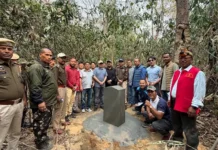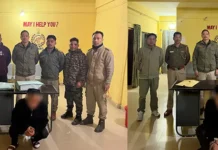[Karyir Riba]
ROING, Jan 30: The Dibang Multipurpose Project Affected Area Committee (DMPAAC) has claimed that “top bureaucrats, including politicians, are under the influence of the NHPC Pvt Ltd” in the decision-making process regarding disbursement of compensation that the affected people are entitled to.
DMPAAC convenor Nogoro Melo said “all hopes and expectations that the affected people had from the state government that it would extend its support to the people in the matter have been dashed to the ground because of the state government’s seemingly insidious intentions to deprive its own people of their entitled right to proper compensation.”
Calling the NHPC a “predator giant corporate,” the DMPAAC claimed that the company has not spared any way to deprive the beneficiaries of their entitled rights.
“Enough is enough. Now we stand strongly for ‘no compensation, no dam’,” the DMPAAC said.
The committee termed an order passed by the secretary of land management (SLM) “impugned,” and claimed that the SLM miserably failed to fulfill the assurances given during the high power committee meeting held on 4 December, 2019, in which the Dibang Valley DC, the Anini MLA, the SLM, the power commissioner, and members of the dam-affected committee were present.
“Following a threadbare discussion after the beneficiaries had placed their grievances, conclusions were drawn that the best possible solution would be made and assurance of greater positive outcomes in favour of the beneficiaries were assured,” the DMPAAC claimed.
“To our dismay, it has been learnt through reliable sources that the final estimation of the compensation were called for without involving the beneficiaries,” it said.
In a letter to the Dibang Valley DC, the committee strongly condemned the manner in which the meeting was conducted, and said it rejects the decisions that were allegedly taken without involving the affected parties.
It requested the DC to include the affected people in the decision-making process, keeping in mind the interest and sentiments of the affected, and to “work independently without being influenced by any higher authority, in order to avoid any unnecessary legal recourse and litigation against the administration.”


